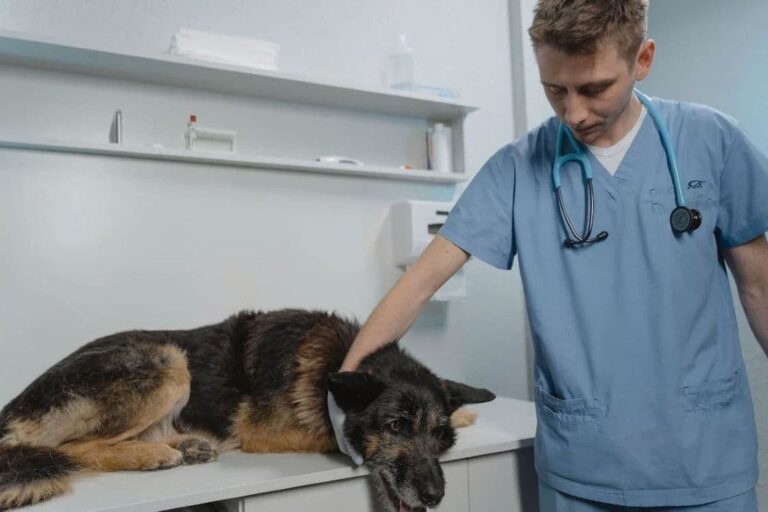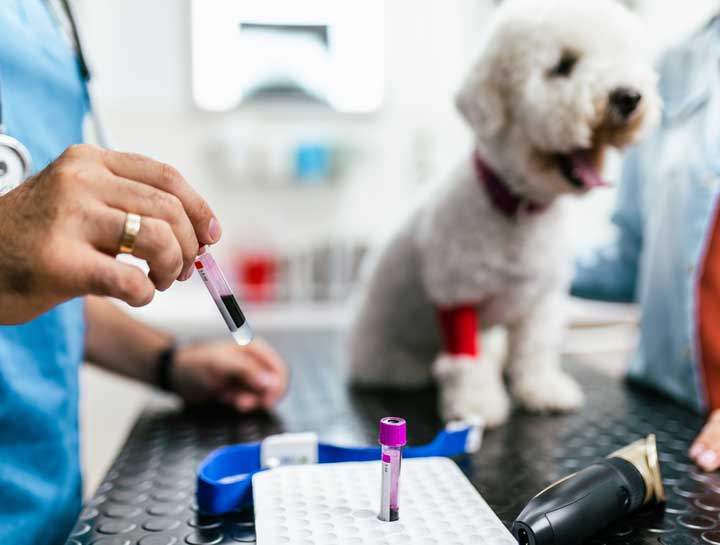When "Why?" haunts you, find answers with a pet necropsy.
Understanding your pet’s health
Pet pathology labs play a crucial role in diagnosing and understanding your pet’s health conditions. From routine screenings to complex disease analysis, these specialized labs offer a range of services to support your veterinarian and provide critical insights into your furry friend’s well-being.
Your connection to expert care
Navigating the world of pet pathology can be overwhelming, especially during difficult times. At Compassionate Pet Transport, we understand the importance of timely and accurate diagnoses. We can facilitate the transportation of your pet’s samples to reputable pathology labs in your area, ensuring your veterinarian receives the information needed for informed treatment decisions. Our compassionate team is here to guide you through the process, offering support and peace of mind every step of the way.
Need a pet autopsy? California necropsy services
Lab For Pets
Offers a variety of laboratory testing including necropsy, blood work, hormone , genetic and infectious disease testing.
23192 Alcalde Dr, Suite A
Laguna Hills, CA 92653
949-426-6638
Necropsy Services Group
NSG (Necropsy Services Group) was founded by Dr. Bill Spangler in 2008 to fill a previously unmet need in veterinary medicine and to provide a complete necropsy service to veterinarians, pet owners and legal services.
1046 Olive Dr. Suite 3
Davis, CA 95616
(530) 297-0470
UC Davis Veterinary
Provide comprehensive professional necropsy and biopsy diagnostic services
1 Garrod Drive
Davis, California 95616
(530) 297-0470
UC Davis California Animal Health and Food Safety
Provide comprehensive professional necropsy and biopsy diagnostic services
105 W Central Ave.
San Bernardino, CA 92408
(909) 383-4287
Pet necropsy
What is necropsy/autopsy
Necropsy, or animal autopsy, is a detailed examination of a deceased animal to determine cause of death, disease extent, or research findings. It involves careful dissection and analysis of tissues and organs.
Why perform a pet necropsy?
- Determines Cause of Death: Uncovers the underlying disease or condition responsible for your pet’s passing.
- Answers Questions: Provides closure and understanding for grieving pet owners.
- Guides Future Care: Informs treatment decisions for other pets with similar symptoms.
- Identifies Underlying Conditions: Detects diseases that may have gone unnoticed.
- Advances Veterinary Knowledge: Contributes to research and improves overall animal health.
Reasons for a pet necropsy
- Unexplained Death: If a pet dies suddenly or unexpectedly, a necropsy can help determine the cause.
- Disease Diagnosis: Necropsies can help diagnose diseases that may have been difficult to identify while the pet was alive.
- Research: Necropsies can be used for research purposes to learn more about diseases and their effects on animals.
- Public Health: In some cases, necropsies may be required to identify zoonotic diseases (diseases that can spread from animals to humans) and prevent outbreaks.
- Legal Cases: If a pet’s death is suspicious or related to an accident, a necropsy can provide evidence for legal proceedings.
The necropsy process
- External Examination: The pathologist examines the pet’s body for any external signs of trauma or disease.
- Internal Examination: The pathologist carefully dissects the pet’s body and examines the internal organs and tissues for any abnormalities.
- Tissue Sampling: Samples of tissues may be collected for microscopic examination or other laboratory tests.
- Diagnosis: Based on the findings, the pathologist makes a diagnosis regarding the cause of death or the extent of disease.
- Report: A detailed report is prepared, summarizing the findings and conclusions of the necropsy.
Choosing a necropsy service
- Veterinarian Referral: Your veterinarian can refer you to a qualified pathologist or laboratory.
- Specialized Laboratories: Some laboratories specialize in animal necropsies and may offer additional services such as histopathology (microscopic examination of tissues) or toxicology testing.
Cost
The cost of a pet necropsy can vary depending on the complexity of the case and the specific tests performed.
Emotional considerations
While a necropsy can provide valuable information, it’s important to consider the emotional impact it may have on you and your family. Some pet owners find comfort in knowing the cause of their pet’s death, while others prefer to focus on remembering their pet’s life.
Pet biopsy and cytology
What is biopsy and cytology
Biopsy and cytology are diagnostic tools for examining tissue and cells to identify diseases like cancer or infections. Biopsies remove small tissue samples, while cytology analyzes cells collected from fluids or surfaces.
Why perform pet biopsy and cytology?
- Accurate Diagnosis: Pinpoints the exact cause of disease, enabling targeted treatment.
- Early Detection: Identifies diseases in their early stages, improving treatment outcomes.
- Personalized Treatment: Guides veterinarians in tailoring treatment plans for each pet’s unique needs.
- Monitoring: Tracks disease progression or response to therapy over time.
- Peace of Mind: Provides pet owners with valuable information about their pet’s health.
Biopsy
Biopsy involves the surgical removal of a small tissue sample, which is then sent to a laboratory for microscopic examination by a pathologist.
This provides a definitive diagnosis, as the pathologist can examine the tissue’s architecture and identify specific cell types and abnormalities.
Cytology
Cytology involves collecting a sample of cells, usually through fine-needle aspiration (FNA) or by swabbing a surface.
These cells are then spread onto a slide, stained, and examined under a microscope. Cytology offers a quicker and less invasive alternative to biopsy, often providing preliminary or presumptive diagnoses.
Key differences between biopsy and cytology
Invasiveness: Biopsy is generally more invasive as it requires tissue removal, sometimes under anesthesia. Cytology is often less invasive, with FNA requiring only a needle prick.
Information provided: Biopsy offers a more comprehensive picture of the tissue, including its architecture and the relationship between different cell types. Cytology focuses primarily on individual cells, which can limit its diagnostic accuracy in some cases.
Speed of diagnosis: Cytology results are often available within a few hours, while biopsy results may take several days.
Cost: Cytology is usually less expensive than biopsy.
Applications: Biopsy is often used for definitive diagnosis of tumors and other masses, while cytology can be helpful for initial assessment, monitoring response to treatment, and evaluating body fluids or effusions.
When to consider biopsy or cytology
Your veterinarian may recommend biopsy or cytology if they detect:
- Lumps or masses on the skin or internal organs
- Enlarged lymph nodes
- Abnormal organ function
- Unexplained symptoms
Both biopsy and cytology are valuable tools for diagnosing and managing various pet health conditions. Your veterinarian will recommend the most appropriate procedure based on your pet’s specific situation.
Pet diagnostics
What is pet diagnostics
Pet diagnostics involves specialized tests and analyses to evaluate a pet’s health, diagnose diseases, and monitor treatment progress. These services include bloodwork, urinalysis, biopsies, imaging, and more.
Why perform pet diagnostics?
- Accurate Diagnosis: Pinpoints exact cause of illness for effective treatment.
- Personalized Treatment: Tailored plans based on your pet’s specific needs.
- Early Detection: Identifies diseases early, improving prognosis and treatment options.
- Monitoring Progress: Tracks response to treatment and adjusts as needed.
- Peace of Mind: Provides you with understanding and confidence in your pet’s care.
Benefits of pet diagnostics
- Early Disease Detection: Many diseases can be detected and treated early with timely diagnostics, improving the chances of successful treatment and recovery.
- Accurate Diagnosis: Helps veterinarians pinpoint the exact cause of a pet’s symptoms, leading to more targeted and effective treatments.
- Monitoring Treatment: Diagnostics can track the progress of a disease and evaluate the effectiveness of treatment.
- Preventive Care: Some diagnostic tests can identify potential health risks and enable preventive measures to be taken.
Common pet diagnostic tools and procedures
Common Pet Diagnostic Tools and Procedures:
-
Imaging:
- X-rays (radiography): Used to visualize bones, internal organs, and detect fractures, tumors, and other abnormalities.
- Ultrasound: Employs sound waves to create images of internal organs and soft tissues, helpful in evaluating heart function, pregnancy, and detecting fluid buildup or masses.
- Computed Tomography (CT): Provides detailed 3D images of the body, useful for diagnosing tumors, fractures, and neurological conditions.
- Magnetic Resonance Imaging (MRI): Produces high-resolution images of soft tissues, especially useful for diagnosing brain and spinal cord problems.
-
Laboratory Testing:
- Blood Tests: Analyze blood samples to assess organ function, detect infections, and evaluate overall health status.
- Urinalysis: Examines urine to check for signs of infection, kidney disease, or other metabolic disorders.
- Fecal Tests: Detect parasites and other gastrointestinal issues.
- Cytology and Histopathology: Microscopic examination of cells and tissues to identify cancer, infections, and other abnormalities.
- Allergy Testing: Identifies specific allergens that trigger an animal’s allergic reactions.
- Genetic Testing: Detects genetic disorders and determines breed predispositions to certain diseases.
-
Other Diagnostic Procedures:
- Endoscopy: Uses a flexible tube with a camera to visualize the internal organs.
- Electrocardiogram (ECG or EKG): Records the electrical activity of the heart to diagnose heart problems.
- Biopsies: Small tissue samples are collected for microscopic examination to diagnose various conditions, including cancer.
Availability
Veterinary Clinics: Most veterinary clinics have basic diagnostic equipment and can perform routine tests in-house.
Specialized Laboratories: For more complex tests or specialized diagnostics, veterinarians may send samples to external laboratories.

Pet Genetic Testing
Pet genetic testing reveals breed ancestry, potential health risks, and unique traits, empowering owners to make informed decisions for their pet's well-being and personalized care.

Pet Toxicology
Pet toxicology investigates the effects of toxins on animals, identifying harmful substances and developing treatments for poisoning, ensuring the safety of our furry companions.

Pet Consulting
Pet consulting provides expert advice and personalized guidance on various aspects of pet care, including behavior, nutrition, training, and health, to ensure your furry friend's well-being and happiness.



